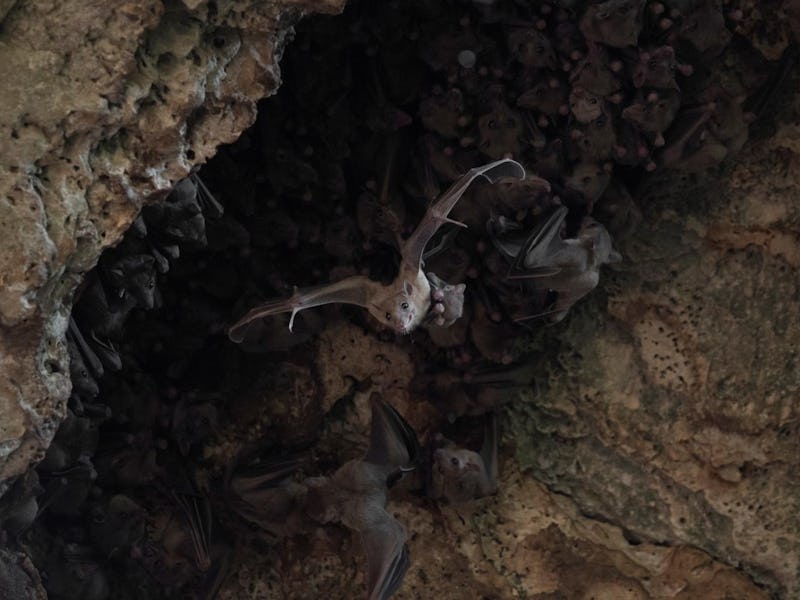Videos Show How a Clever Species Has Learned to Trade Food for Sex
Introducing the "food-for-sex" hypothesis.

In successful relationships, partners let each other get away with annoying behaviors like leaving the toilet seat up, chewing loudly, and eating each other’s food. Some bats aren’t much different. Research published Thursday in Current Biology shows that female Egyptian fruit bats often steal food right out of the mouths of males — but the males don’t mind because of what the females give in return.
In the paper, Tel Aviv University researchers who observed a colony of captive bats saw females frequently stealing food from males — often directly from their mouths. But this is not a one-sided transaction. When these females gave birth to pups, paternity tests revealed they had been impregnated by the males they scrounged food from. This apparent trade deal is called the “food-for-sex hypothesis.”
“The food-for-sex hypothesis, namely the provision of females by males in return for mating opportunities, has been suggested to act in instances of intersexual cooperation and to serve as a driving force of sexual selection,” the authors write. “In this study, we have found strong evidence for such relationships in a bat colony.”
As shown in the video below, female Egyptian fruit bats will scrounge food from males, often aggressively. These interactions, which look somewhat violent, make a little more sense when viewed through the food-for-sex hypothesis lens.
This idea says that the male bats will tolerate what might look like intolerable behavior as long as they get the chance to mate at some point in the future, therefore ensuring that their genes are passed on. In this way, the evolutionary advantage of being a super chill partner appears to have suited these bats.
Another possible explanation is that they’re not just tolerating the interactions but welcoming them. Much like a brilliantly colored fish attracts its mate with a showy display of health and fitness, the male bats may actually be showing off their value to the female bats by demonstrating their superior foraging abilities. And what’s more attractive to a potential mate than showing off one’s abilities? As the study’s authors point out, this display becomes even more valuable when a male shows off abilities that require time, effort, and energy.
“Importantly, in the wild, collecting food items may impose several types of costs on the producer bat, including the energy spent while searching for, and harvesting, ripe fruits; the competition over available food on a specific tree; and the risk of predation during landing on and handling an exposed fruit,” they write.
But the researchers note that no particular male seemed to show its dominance over the others in terms of demonstrating its value as a forager. In fact, female bats expressed clear preferences for certain male bats, scrounging food from them for a while before they ever mated. Plus, there appeared to be very little overlap between their preferences — that is, multiple females were almost never competing for the affection of the same male. Therefore, the researchers conclude that males who allow females to scrounge food from them in exchange for mating opportunities are engaging in a mutually beneficial relationship.
“We hypothesize that the observed relation between food scrounging and mating is a form of mutualism exhibited in delayed reciprocity: scrounging food from a successful male forager diminishes the costs of foraging and is compensated, if consistent over time, by rewarding the male with mating opportunities,” they write.
So there it is. Male Egyptian fruit bats who let female bats steal their food end up getting laid. It’s not exactly romantic, and few people would want to enter a relationship where tolerating bad behavior is rewarded with sex, but hey, it seems to work for these bats.
Abstract: Food sharing is often evolutionarily puzzling, because the provider’s benefits are not always clear. Sharing among kin may increase indirect fitness, but when non-kin are involved, different mechanisms were suggested to act. Occasionally, “tolerated theft” is observed, merely because defending a resource is not cost effective. Sharing may also be explained as “costly signaling,” where individuals signal their high qualities by distributing acquired resources, as has been suggested to occur in certain human cultures. Alternatively, a transferred food item might be compensated for in later interactions. In vampire bats, blood sharing reflects reciprocity between non-kin colony members, and long-term social bonds affect food sharing in chimpanzees. Food may also be exchanged for other goods or social benefits. One reciprocity-based explanation for intersexual food sharing is the food-for-sex hypothesis. This hypothesis proposes that males share food with females in exchange for mating opportunities. Studies on human hunter-gatherer societies suggest that males with increased foraging success have higher reproductive success. Male chimpanzees, which in contrast to humans do not maintain pair bonds, were suggested to share food with females to increase their mating opportunities. Bats, which are long-lived social mammals, provide an opportunity to study long-term social reciprocity mechanisms. We monitored producer-scrounger interactions of a captive Egyptian fruit bat (Rousettus aegyptiacus) colony for more than a year and genetically determined the paternity of the pups that were born in the colony. We found that females carry the young of males from which they used to scrounge food, supporting the food- for-sex hypothesis in this species.